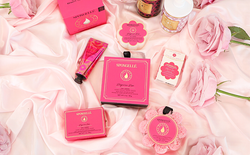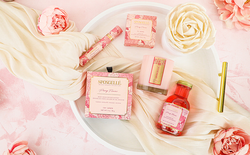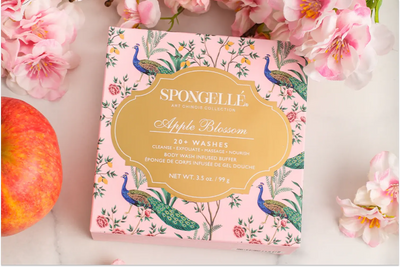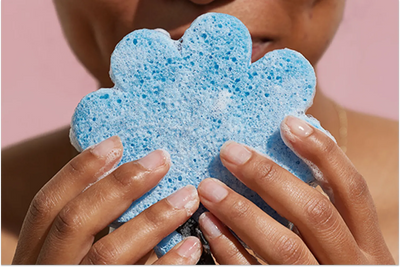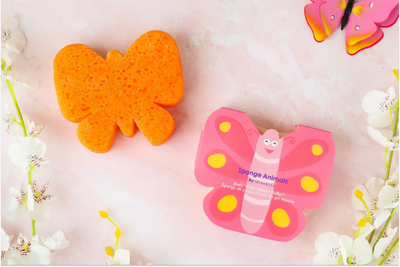There is a lot of misinformation out there when it comes to washing your hands. You have probably heard everything under the sun about which hand soap you should be using to wash your hands. Some say you should only use hand soap; others say you should only use antibacterial soap. And others say you should be using dish soap! If you’re like most people, you probably want to have good hygiene and keep your body healthy, clean, and germ-free, but how are you supposed to know which hand soap is best with all this different information?
We’ll make it easy for you. Spongellé offers the best hand soap you can get, and it comes infused in an antibacterial buffer. In this article, we will discuss the pros and cons of different types of soaps and why our buffers will do the best job of killing bacteria and removing dirt and oil without drying and stripping the skin. We will also talk about how often you should be washing your hands and how you should wash them for proper and thorough cleansing. Consider this your guide to the best hand soap and when and how you should wash your hands!
Is There a Difference Between Hand Soap and Antibacterial Soap?
Yes, there is a difference between hand soap and antibacterial soap. Antibacterial soap contains antimicrobial ingredients that are added to the soap. This means the soap will work to stop the growth of bacteria and microorganisms. If soap is antibacterial, it will say so on the label. Otherwise, it is regular hand soap.
It helps to kill bad bacteria, but it also kills good bacteria that our bodies need to keep a healthy and balanced environment on the skin’s surface. If you overuse it, then it will reduce the number of healthy bacteria you have. And, since there are added chemicals, antibacterial soap can actually dry out your skin, even when you don’t overuse it. This is because it strips the skin of its natural oils. So, it’s definitely good to use if you are in public and touch things (like if you go on an airplane, for example), but it is not necessary to use it every single time you wash your hands.
Regular hand soap is great for consistent daily use, and it is also effective in removing bacteria from your skin. The difference is it works to physically remove the germs by decreasing water’s surface tension, whereas antibacterial soap uses chemicals to kill the germs. It is especially effective at lifting dirt and oil from your hands, which is why it’s great for regular use throughout the day. One major pro of using regular hand soap is that it won’t remove healthy bacteria from the skin. Regular hand soap is as effective as antibacterial soap in removing bad bacteria from your skin, as well as cleansing the skin.
Should You Use a Body Buffer When Washing Your Hands?
Yes, you should definitely consider using a buffer for washing your hands! There are a few reasons for this. The main reason is that it is much more effective at removing dirt and grime along with killing bacteria. Another reason is that it can clean those hard-to-reach nooks and crannies in between your fingers that we often miss just by washing our hands manually. Plus, using a buffer will help remove any dead skin that has built up from overwashing your hands or from the cold weather, leaving you soft and smooth.
The buffer you should be using is our Hand Defense buffer. It is more effective at removing germs and dirt than just hand soap alone (either antibacterial or regular), and each one will give you 40+ washes! The buffer is infused with two things: hand soap and an antibacterial agent. This antibacterial agent is important because it prevents bacteria from forming on your buffer in-between uses. Did you know that regular loofahs, sponges, and buffers are a breeding ground for bacteria?
It’s gross, but true! Bacteria thrive when things are damp and dark, so they are attracted to things like sponges and buffers when you use them, and they are damp afterward. They can fit into the folds and holes on the sponge, and then that bacteria gets transferred right back to your skin when you use it. This makes them unsanitary and actually defeats the purpose of using them in the first place. With Spongellé, you never have to worry about that, and you will get a clean and sanitary wash every single time.
When washing your hands with our hand buffer, there are a few steps you should follow in order to get the best clean. First, you should turn on the warm water (not too hot that it will burn you). Wet your hands thoroughly before you reach for your buffer. Then, take your buffer and scrub your hands until you work the soap into a lather. You should try and get every part of your hands and fingers, making your way up to your wrists.
Do this for about 20 seconds, which is the recommended time to effectively kill bacteria and remove dirt from the skin. Next, rinse all the soap off with warm water. Get a clean towel and gently pat your skin dry. It’s important to pat and not rub the skin, because rubbing will dry the skin out and irritate it. After you have finished washing your hands, follow up with your favorite Spongellé hand cream to lock in moisture and keep your hands smooth.
How Often Should You Wash Your Hands?
Now that you know all about the different types of hand soaps and which ones are the best, you might be wondering how often you should be washing your hands. This might seem like a silly question, but so many people are not washing their hands enough! You can’t really wash your hands too much, but there is definitely a point at which you might be overwashing your hands which causes dryness, irritation, and sometimes red and flaking skin.
Of course, it’s always better to wash your hands too often than not often enough. If you are an over-washer or an under-washer, then it is a good idea to find a balance. That way, you can make sure you are sanitary without washing your hands to the point of being raw (because no one wants scaly, dry hands, right?).
So, how often should you be washing your hands? The answer is, it really depends on what you’re doing. If you need specific instances, the answer is: pretty much any time after you are in a public place, or when you are cooking and using raw meat or eggs. You should also wash your hands before touching your face, eyes, nose, or mouth. These are the most common times when you should wash your hands, but there are several other times when it’s important.
Before you eat, after you use the bathroom, before you perform first aid, and after you take out the trash are all other times when you should wash your hands. Basically, you should be washing your hands after you touch anything outside of your household and anything dirty inside of your household. If you leave the house, you should probably be washing them when you get back inside. You just never know what sort of germs you might pick up while out in public.
Conclusion
Hopefully, after reading this, you know that washing your hands with hand soap is imperative to your overall health. And, you now know that, while there’s a difference between hand soap and antibacterial soap, they both accomplish the same job. Hand soap removes germs (just the bad ones), while antibacterial soap kills them (both the good and the bad). You should use antibacterial soap after touching things in public, and hand soap throughout the day at home while cooking or after using the bathroom. When it comes to the best hand soap, Spongellé has got you covered.
Our hand buffers are perfect for removing dirt, build-up, and any other oils or grime that make their way onto your hands. Plus, they prevent bacteria growth with their antibacterial-infused properties. They work to cleanse, exfoliate, and hydrate the skin, unlike regular soaps that are often the cause of dry skin and irritation. If you are looking for the best hand soap, look no further. Our hand buffers will leave your hands germ-free and super soft after every wash.
Sources:
Antibacterial Soap vs. Regular Soap: Which One Is Better? | Unity Point.
How Long Should You Wash Your Hands? | Healthline
Do You Know What’s Growing on Your Loofah? | Cleveland Clinic


